DePIN Association Officially Formed to Advance Decentralized Infrastructure Networks
Thursday, July 25, 2024 4:01 PM
209

The DePIN Association has officially formed, uniting ten organizations to advance decentralized physical infrastructure networks. Founding members include Acurast, peaq, DePINHub, PowerLedger, U2U Network, POKT Network, SafeJunction, IoTeX, and Geodnet, each contributing to a connected, decentralized world vision. The association aims to foster innovation, set industry standards, and promote decentralized infrastructure networks using blockchain for transparency, security, and efficiency. Initiatives include standardization, R&D support, education, and events.
Buy Now at
Related News
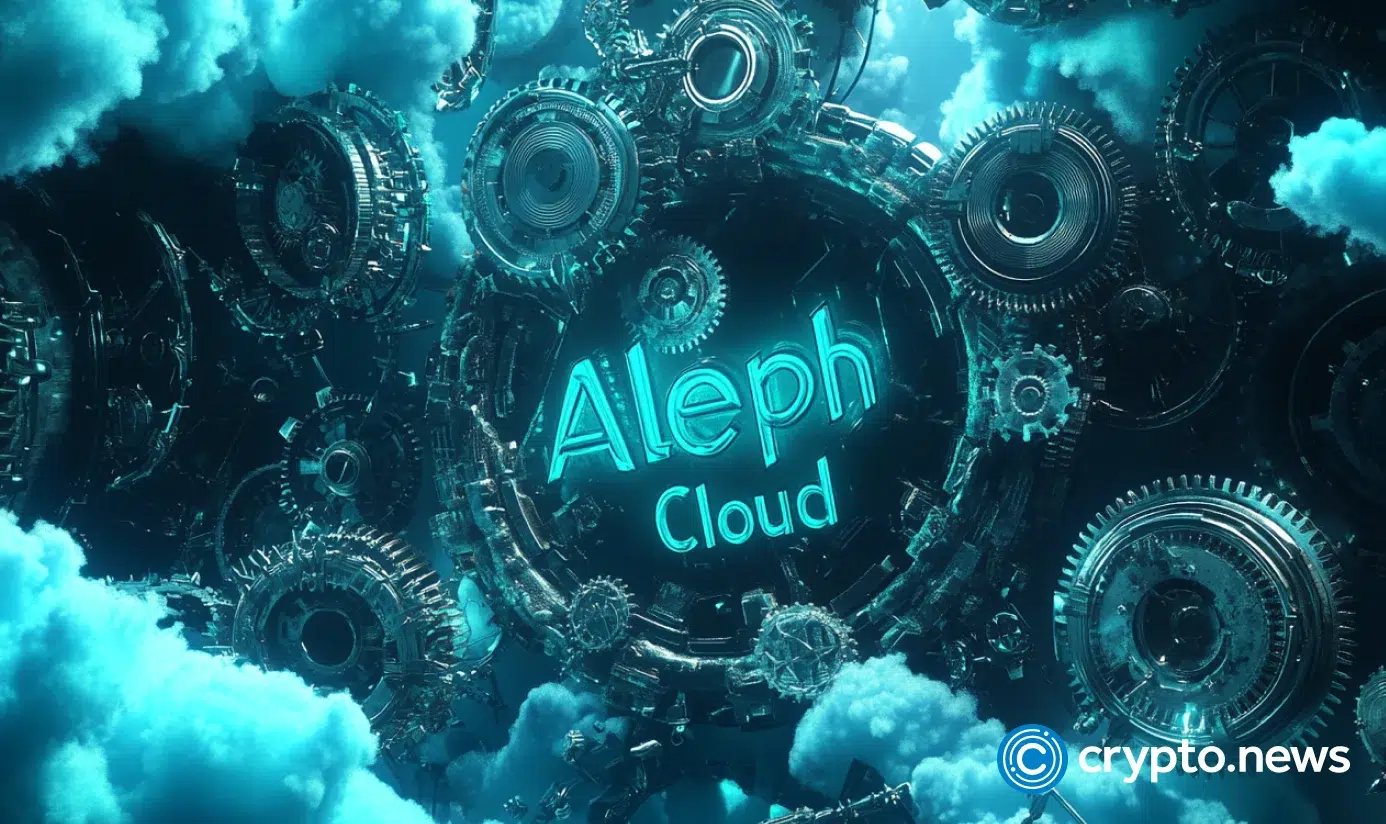
6 days ago
Aleph.im Rebrands to Aleph Cloud, Launches $1 Million Accelerator for Web3 StartupsAleph.im, a prominent player in decentralized infrastructure, has officially rebranded as Aleph Cloud, marking a significant evolution in its service offerings. This transformation, announced on April 23, reflects the company's ambition to become a comprehensive decentralized cloud provider. The rebranding comes with an expanded product suite that includes decentralized compute, storage, virtual machines, and GPU resources, all aimed at supporting next-generation Web3 and AI applications. In conjunction with this rebrand, Aleph Cloud has introduced a $1 million startup accelerator program designed to assist Web3 builders and startups in moving away from centralized cloud services like AWS and Google Cloud, which currently dominate the blockchain infrastructure landscape.
The newly launched accelerator program aims to provide essential resources such as compute credits, storage, and technical support across various ecosystems, including Ethereum, Base, Solana, BSC, and Avalanche. Jonathan Schemoul, CEO of Aleph Cloud, emphasized the importance of decentralization in blockchain applications, stating that reliance on centralized services poses risks. The program is structured to support early-stage developers by offering free access to cloud services for projects with a tangible product or proof of concept, thus fostering a thriving ecosystem of decentralized applications.
Aleph Cloud’s strategy positions it as a competitor in the growing market for decentralized infrastructure, where it faces established players like Filecoin and Akash. Schemoul highlighted the platform's unique all-in-one design, which allows users to manage compute, storage, and hosting through a single interface. With a focus on compliance and data privacy, Aleph Cloud operates as a GDPR-compliant, chain-agnostic platform, ensuring that neither the company nor its node operators can access stored data. This commitment to decentralization and user privacy sets Aleph Cloud apart as it seeks to redefine the cloud services landscape for Web3 and AI developers.
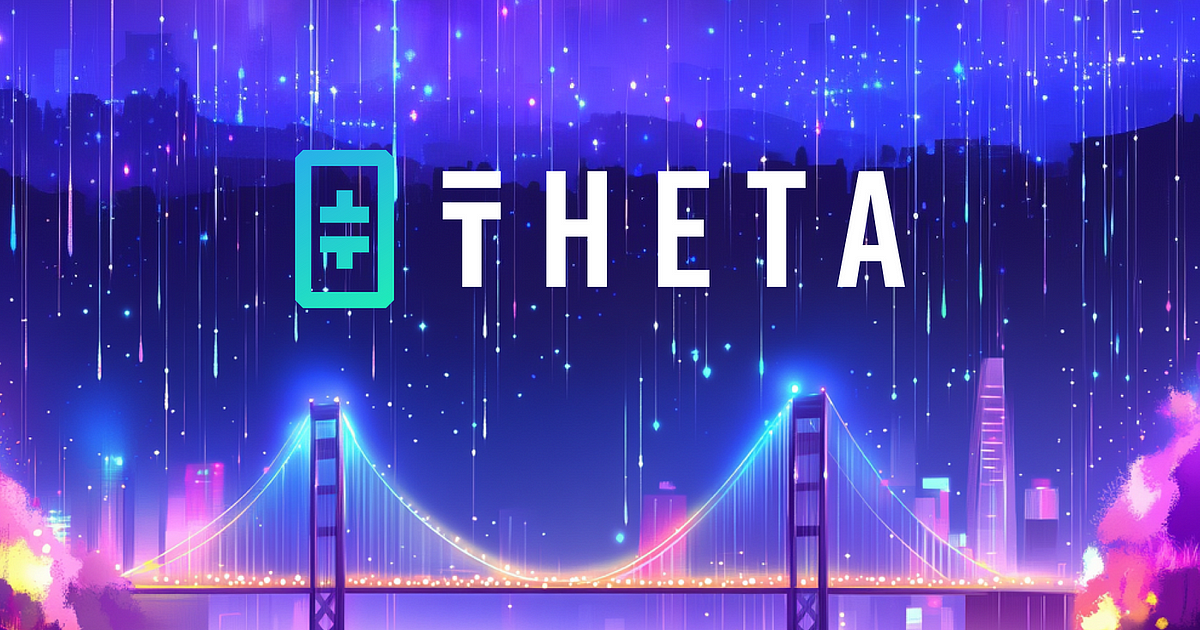
12 days ago
Stanford's AI Research Lab Partners with Theta EdgeCloud for Enhanced ResearchStanford Engineering Assistant Professor Ellen Vitercik's AI research lab is set to leverage Theta EdgeCloud's hybrid cloud infrastructure to enhance its research in discrete optimization and algorithmic reasoning. This collaboration will enable the lab to utilize EdgeCloud's decentralized GPU, which offers scalable and high-performance computing power at a competitive cost. The integration of this technology is expected to significantly accelerate the training of AI models and facilitate advanced research initiatives. Other prominent academic institutions, such as Seoul National University, KAIST, and the University of Oregon, are also utilizing EdgeCloud's infrastructure to boost their AI research productivity.
Ellen Vitercik specializes in machine learning, algorithmic reasoning, and the intersection of computation and economics. Her research lab is focused on several key areas, including the application of large language models (LLMs) for optimization, algorithmic content selection, and the generalization of clustering algorithms across various dataset sizes. By employing Theta EdgeCloud's resources, the lab aims to explore how AI can enhance decision-making processes in economic contexts, such as pricing strategies and targeted marketing.
Theta EdgeCloud's hybrid GPU infrastructure is designed to provide on-demand computing power that is both scalable and cost-effective, making it an ideal solution for academic research. The collaboration with Vitercik's lab exemplifies the growing trend of integrating advanced cloud computing technologies into academic research, particularly in the field of AI. This partnership not only promises to advance Vitercik's research objectives but also contributes to the broader landscape of AI research across multiple institutions worldwide.

a month ago
The Rise of Decentralized Physical Infrastructure Networks in Cloud ComputingAs technology continues to evolve, the Decentralized Physical Infrastructure Network (DePIN) is emerging as a transformative force in the realm of cloud computing. Built on blockchain technology, DePIN utilizes individual hardware devices, known as nodes, which can range from personal computers to IoT devices. This decentralized network eliminates the need for a centralized authority, enhancing security and transparency while outperforming traditional systems in efficiency and scalability. With the rise of AI applications, decentralized networks are becoming essential for managing data collection and processing, as highlighted by a recent CoinDesk report indicating that the market capitalization of DePIN tokens has exceeded $25 billion, driven by advancements in computing and AI sectors.
Several projects exemplify the potential of DePIN technology. Akash, often referred to as the "Airbnb of cloud computing," connects sellers of excess computing resources with buyers, creating an open-source platform for cloud services. Meanwhile, io.net focuses on providing a decentralized GPU network for machine learning applications, boasting 83,000 GPUs and significant cost savings compared to traditional providers. Grass, another DePIN initiative, allows users to share their internet bandwidth in exchange for rewards, while Koii aims to democratize access to decentralized computing by enabling any device to participate in the network, thus broadening the scope of user involvement and reward opportunities.
Despite the promising advancements, the DePIN market faces challenges in establishing a sustainable revenue model. Many projects rely on a dual-token system to balance supply and demand, akin to the Goldilocks problem of finding the right equilibrium. To foster growth, initiatives like Koii's EZSandbox are simplifying the onboarding process for developers, providing tools and resources to create and test decentralized applications. Collaborations, such as Koii's partnership with the Web3 search engine Adot, further enhance network efficiency and accessibility. As the reliance on cloud computing grows, DePIN platforms like Koii, Akash, and Grass are poised to reshape the landscape of decentralized computing, making it more accessible and cost-effective for users worldwide.
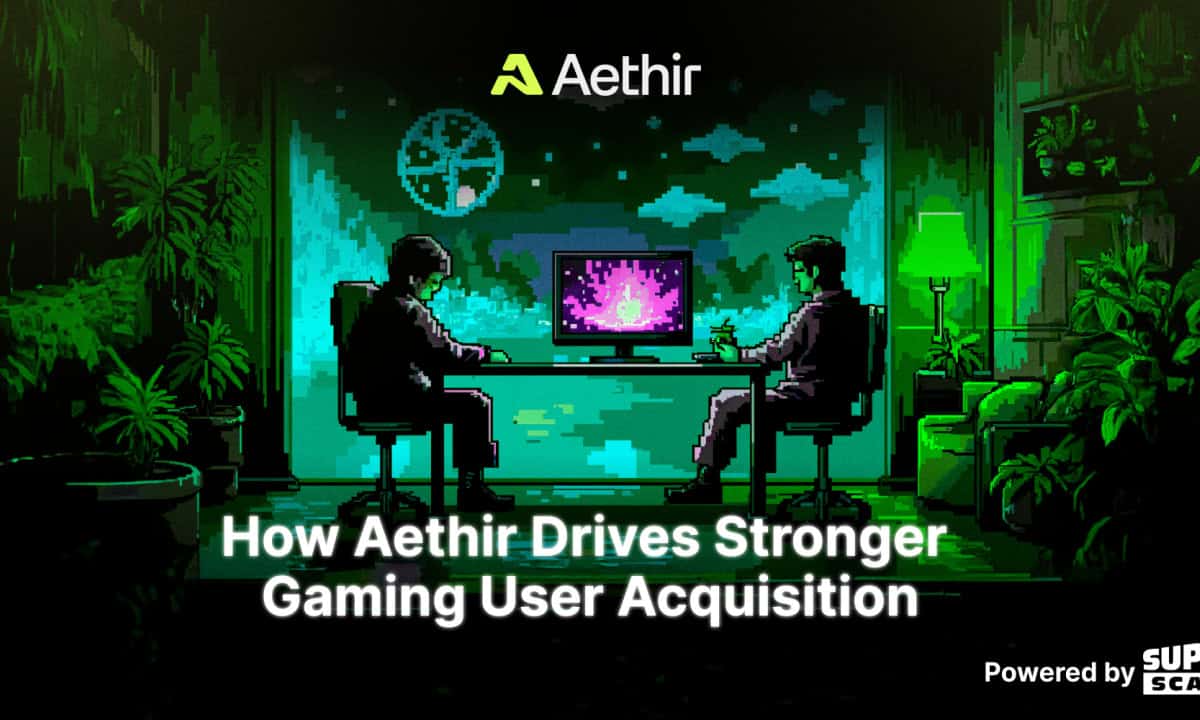
2 months ago
Aethir Revolutionizes Gaming User Acquisition with Decentralized Cloud StreamingAethir, a decentralized cloud gaming infrastructure provider, has recently been highlighted in a case study by SuperScale, a leading expert in gaming user acquisition. The study delves into how Aethir's innovative cloud streaming technology can significantly enhance user acquisition strategies for gaming studios, offering a scalable alternative to traditional app store distribution. By leveraging web-based streaming, Aethir allows studios to bypass the high service fees associated with commercial app stores, which can take up to 30% of a game's revenue. This independent publishing model not only reduces costs but also improves user acquisition efficiency.
The case study conducted by SuperScale involved a two-phase analysis focusing on Aethir's impact on user acquisition metrics, particularly conversion rates and return on ad spend (ROAS). In the first phase, the analysis of engagement methods such as “Stream Now,” “Instant Play,” and “Download” revealed that 43% more players preferred instant play over direct downloads. Furthermore, click-through rates increased by 35%, and conversion rates for the streaming option were found to be 45% higher than traditional methods. These findings underscore the effectiveness of Aethir's cloud streaming in attracting and retaining users.
In the second phase, SuperScale measured early user engagement and ROAS, comparing behaviors between app store downloads and Aethir's Stream Now feature. The results were compelling, showing that 143% more users engaged with the Stream Now feature, with a 75% increase in day 7 ROAS. Additionally, average revenue per user grew by 93%, and session counts increased by 77%. Aethir's cloud streaming infrastructure presents significant potential for established publishers, live service games, and emerging markets, making it a vital tool for optimizing revenue models and enhancing user acquisition strategies in the gaming industry.

2 months ago
Navigating Regulatory Challenges in Decentralized Physical Infrastructure NetworksThe era of aggressive crypto enforcement led by former U.S. Securities and Exchange Commission (SEC) Chair Gary Gensler may have passed, but the regulatory challenges facing decentralized physical infrastructure networks (DePIN) remain unresolved. Even with a more pro-crypto stance from the current administration, the lack of regulatory clarity continues to stifle innovation and growth in the sector. DePIN integrates blockchain with real-world infrastructure, ranging from decentralized cloud services to telecommunications and environmental data collection. This hybrid nature creates a regulatory grey area, leaving DePIN projects uncertain about compliance requirements.
Despite the growing importance of DePIN solutions, the SEC has failed to articulate clear rules regarding their governance and tokenomics. The absence of specific regulations forces DePIN projects to navigate vague compliance landscapes, diverting critical resources from innovation to legal expenses. A more structured regulatory framework should address key areas such as the classification of tokens, ensuring that DePIN tokens, which often serve functional purposes, are not misclassified as securities. Establishing clear rules for issuance and usage would protect investors while enabling sustainable growth.
Moreover, robust privacy regulations are essential for DePIN projects that collect real-world data. A transparent regulatory framework should outline data storage, protection, and monetization policies to maintain user trust. Additionally, many DePIN initiatives involve cross-border hardware deployments, raising compliance issues with diverse national laws. Aligning regulatory frameworks across jurisdictions would reduce barriers to growth. The SEC has an opportunity to shift from punitive enforcement to proactive guidance, creating a balanced regulatory approach that encourages innovation while ensuring compliance. By establishing clear regulations, policymakers can unlock DePIN’s full potential, enhancing connectivity, security, and sustainability in the blockchain space.
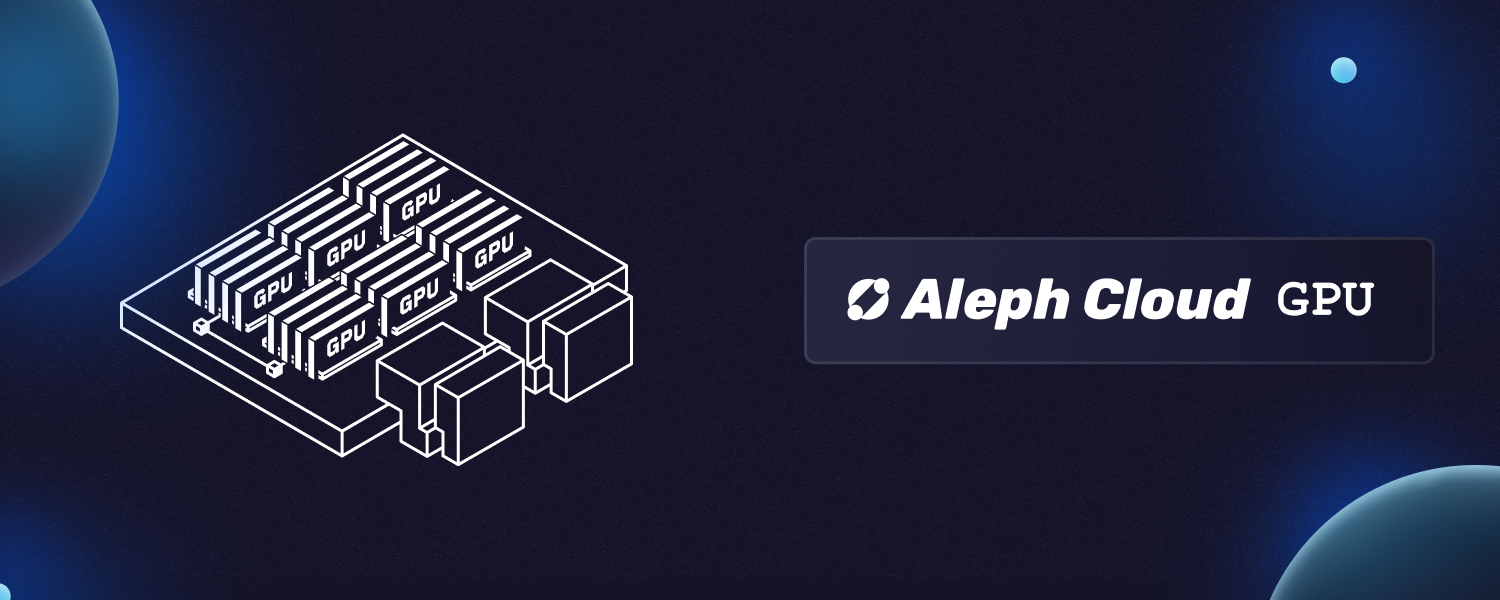
2 months ago
Unlock unparalleled computing power with GPUs on Aleph Cloud GPUs are now integrated into [Aleph Cloud](https://aleph.im/), providing high-performance computing for AI services, rendering, gaming, AI agents, and more.
We are proud to announce a significant milestone for our decentralized cloud ecosystem with the latest integration of GPUs. The new Aleph Cloud Core Channel Node application introduces GPU integration, a transformative feature that positions Aleph Cloud as a powerful and more competitive solution for high-performance computing needs. In addition, this release brings account management capabilities, pricing estimations, and a host of performance improvements, making Aleph Cloud an even more robust platform for developers and enterprises alike.
With GPU support, users can now unlock unparalleled computing power for tasks such as AI training, rendering, gaming, and running AI agents. By leveraging decentralized infrastructure, Aleph Cloud offers both scalability and flexibility at highly competitive prices, all through the convenience of a Pay-as-You-Go (PAYG) model using ALEPH tokens.
# Revolutionizing cloud computing with GPU integration
The integration of GPUs into Aleph Cloud marks a pivotal step forward. By enabling access to both consumer-grade and enterprise-grade GPUs, users can now select the exact resources they need through our intuitive interface at console.twentysix.cloud. This empowers them to scale their workloads seamlessly, whether they are building machine learning models, rendering complex graphics, or powering cloud-based gaming platforms.
Each GPU model is paired with specific vCPU, RAM, and disk allocations, ensuring peak performance for any workload. For example, an RTX 4090, ideal for gaming or smaller AI projects, will cost around $240 per month*, while an enterprise-grade H100, designed for data-intensive operations, costs approximately $1,920 per month*.
# Enhanced Pay-As-You-Go model
Aleph Cloud’s PAYG model is designed to offer flexibility and cost transparency, a critical advantage for businesses and developers. With ALEPH tokens as the exclusive payment method, users can enjoy a seamless payment experience across blockchains like Base, and Avalanche. This ensures not only affordability but also accessibility to a global audience.
Additionally, when a user provisions a GPU-powered virtual machine and initiates a payment, the system will automatically create two payment streams. 80% of the payment will be allocated directly to the node operator providing the compute power, while 20% will contribute to the Aleph Cloud treasury. This model ensures a fair and sustainable distribution of resources, incentivizing node operators while also reinvesting in the continued growth and development of the Aleph Cloud ecosystem.
The pricing structure is straightforward yet highly competitive. For instance:
* Consumer GPUs like the RTX 4090 are priced at ~$111 per month, while an RTX 4000 ADA costs only ~$55 per month*.
* Enterprise GPUs such as the A100 and H100 are geared towards intensive tasks, priced at ~$875 and ~$583 per month*, respectively.
This transparent structure enables users to budget accurately, scaling their resources as their projects evolve.
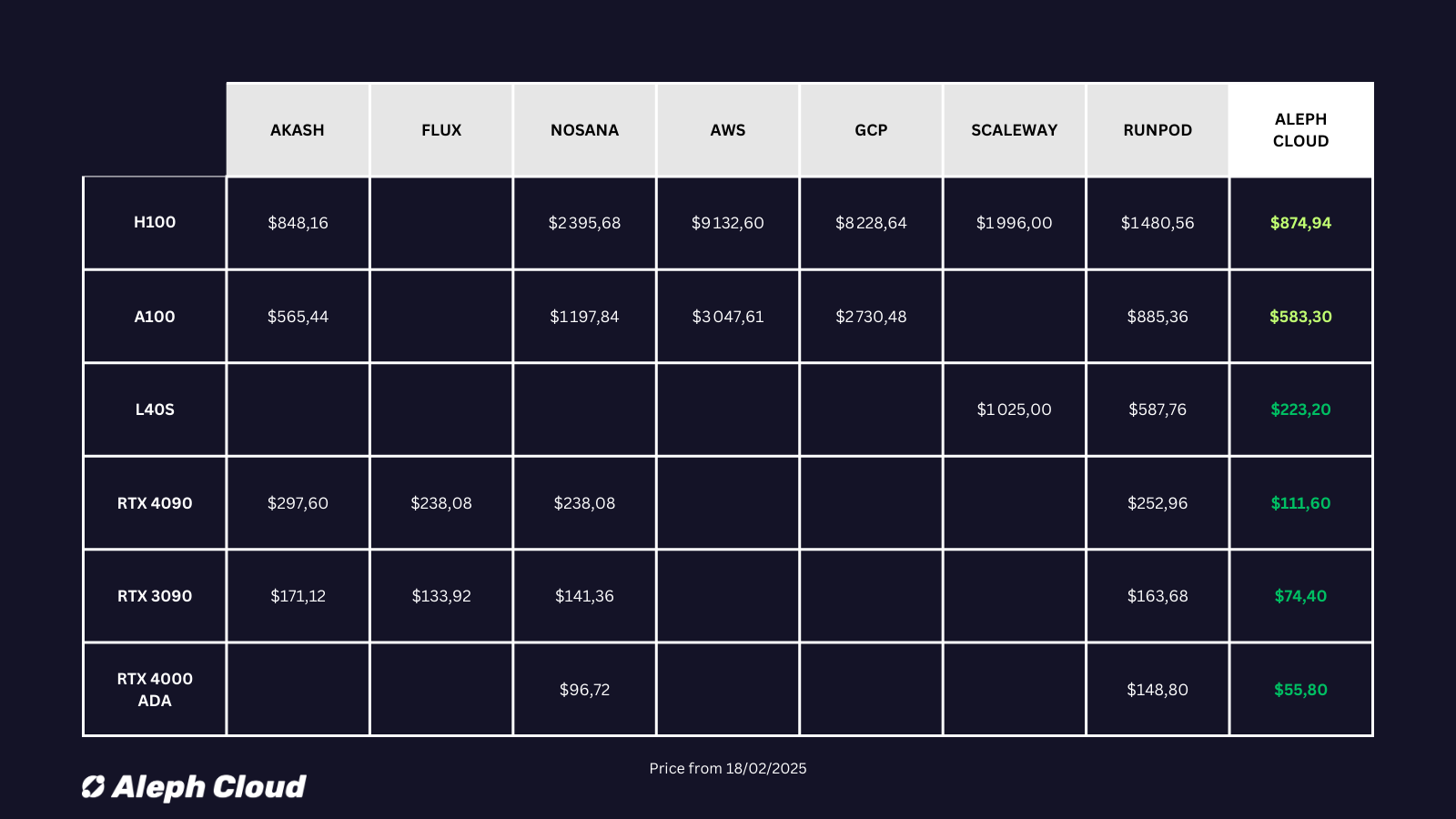
Pricing breakdown as of 18/02/2025
# New features for an optimized user experience
In addition to GPU integration, this release introduces several features aimed at enhancing performance and usability. Among the key highlights:
* Aggregates caching: By implementing caching for owner aggregates and metrics data, the platform now offers faster response times and smoother performance.
* Pricing estimation: Users can now estimate the cost of executable messages before sending them, providing greater transparency and control.
* Pre-calculated balances: This feature significantly improves system performance by reducing computational overhead.
* Cost service updates: The cost service now uses pricing aggregates for more accurate estimations.
These enhancements collectively make Aleph Cloud more reliable and user-friendly, reinforcing its position as a leading solution for decentralized cloud computing.
## Unlocking new use cases with GPUs
The addition of GPUs extends Aleph Cloud’s capabilities to serve a diverse range of industries and applications:
* AI and machine learning: Train and deploy machine learning models faster and more efficiently.
* Rendering: Create stunning visual effects and high-quality 3D graphics with reduced rendering times.
* Gaming: Deliver seamless, high-performance experiences for cloud gaming platforms.
* AI agents: Power advanced AI agents with robust, decentralized computing resources.
These use cases showcase the versatility of Aleph Cloud’s GPU offering, making it a compelling choice for developers, creators, and businesses alike.
# Looking Ahead
The release of GPU integration and the accompanying features represents a significant leap forward for Aleph Cloud and its community. As we continue to enhance our platform, we remain committed to empowering users with the tools they need to innovate, scale, and succeed in a decentralized world.
To explore these new features and start leveraging GPUs on Aleph Cloud, visit [console.twentysix.cloud](https://console.twentysix.cloud/computing/gpu-instance/) today. For more updates, follow us on Twitter and join our Discord community. Together, let’s redefine the future of cloud computing.
*Those pricing are converted in USD from the current price of ALEPH token. This data should evolve in time*
Signup for latest DePIN news and updates